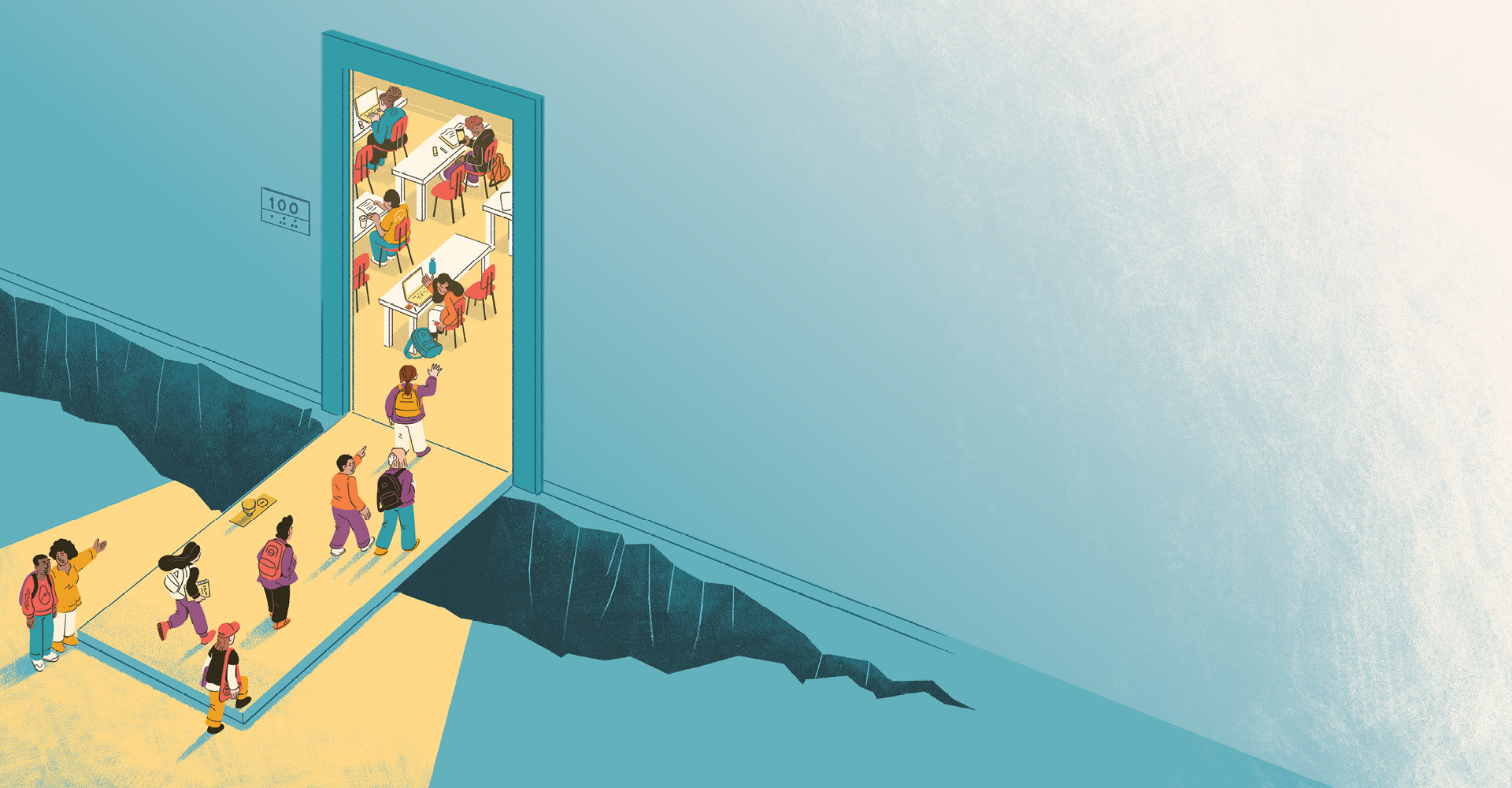
By Matt Itelson
Illustration by Drew Lytle
The University's Inclusion Pilot Project is opening new learning opportunities to people with intellectual and developmental disabilities.
Despite the 45-mile commute to the SF State campus, Ishaan Joshi doesn’t mind arriving hungry. He nourishes his stomach, and mind, in the plant-based cooking class he takes in the Vista Room restaurant in Burk Hall.
Ishaan Joshi is one of five students taking SF State classes through the Inclusion Pilot Project (IPP). Launched in 2021, the certificate program allows adults with intellectual and developmental disabilities to weave themselves into the fabric of campus life and gain job and life skills. It is the only program at a Bay Area doctoral institution for students with intellectual and developmental disabilities. It’s also the only one that is inclusive — meaning that students with and without disabilities take classes together.
“This program at SF State has helped me learn a lot of new ways of cooking. I have gained more confidence and am able to cook independently,” Joshi says using his augmentative and alternative communication device. He is a vegetarian whose parents accompany him to campus from their home in Dublin every week.
English Language and Literature Professor Julie Paulson and Special Education Associate Professor Kathleen Mortier (M.A., ’98) received a Disability Rights California grant to create the pilot program.
“My personal goal is that anybody can come to San Francisco State. Wherever you are on the disability spectrum, there is a place here for you,” says Paulson, the mother of a child with Down syndrome. “I think it’s critical that we have people with intellectual and developmental disabilities on campus to participate in conversations about the disabilities that they have and how they’re served.”
Paulson also cites a need to provide job skills to people with intellectual and developmental disabilities. In 2016, the statewide employment rate was 14.2% for people with developmental disabilities and 35% for people with all types of disabilities, according to the California State Council on Developmental Disabilities. Post-secondary education for people with intellectual disability has proven to be both cost-effective and cost-efficient, according to a 2018 study published in Inclusion, a journal of the American Association on Intellectual and Developmental Disabilities. The 2020 national Transition and Postsecondary Programs for Students with Intellectual Disability report shows positive outcomes for students in post-secondary inclusion programs, including a 64% employment rate and a 78% program completion rate.
Rianna Diaz, a senior majoring in Speech, Language and Hearing Sciences, has served as a peer mentor for Joshi and one other IPP student. Diaz says the project will help her achieve her goal of becoming a paraprofessional in San Francisco public schools. Now that she is able to be in person with them, the value of her experience is compounded.
“With in-person, I get to know him a little better and his quirks,” she says. “It helps me understand him better as a learner and as a person.”
Her studies and personal experience made her an advocate for inclusive learning for people with disabilities. Her brother was a special education student, and she believes he would have benefited from being integrated into a more blended classroom.
“There’s usually a divide,” says Diaz, an alumna of the San Francisco Unified School District. “Even when I was in high school, the special education students were in the back of the school. They were completely separate from the general education classes.”
IPP students enroll through SF State’s College of Extended Learning. Then they receive an individualized education plan that aligns with their personal, academic and career goals. Special Education Assistant Professor Mayumi Hagiwara oversees budget and logistics. Each IPP student is paired with an SF State student mentor, coordinated by Special Education Lecturer Sadie Egan (B.A., ’11; M.A., ’14).
After graduating, Ash Verwiel (B.A., ’21) has continued to serve as a peer mentor to IPP student Auggy Garcia. They have collaborated on several projects, combining Garcia’s talents as a comic artist and Verwiel’s skills in film production.
“I’ve grown a lot as an artist and person since attending SFSU,” Garcia says. “It’s great to feel like everyone else and not be treated differently.”
Verwiel adds: “It’s made me grow as a human and made me be more patient and more clear. It’s been great to connect and make something together that we enjoy.”
Joshi’s parents credit IPP directly for significant improvements in their son’s confidence, as SF State marked the first time in his life that he took a class with non-disabled students.
“Going to a university itself is a great achievement for Ishaan and for us,” his mother Bhakti Joshi says. “He is getting a full arena to meet people, which I don’t think would have been possible otherwise without the [Inclusion Pilot Project] team.”
To learn more about the Inclusion Pilot Project, visit cel.sfsu.edu/inclusion or contact Hagiwara at hagiwara@sfsu.edu.